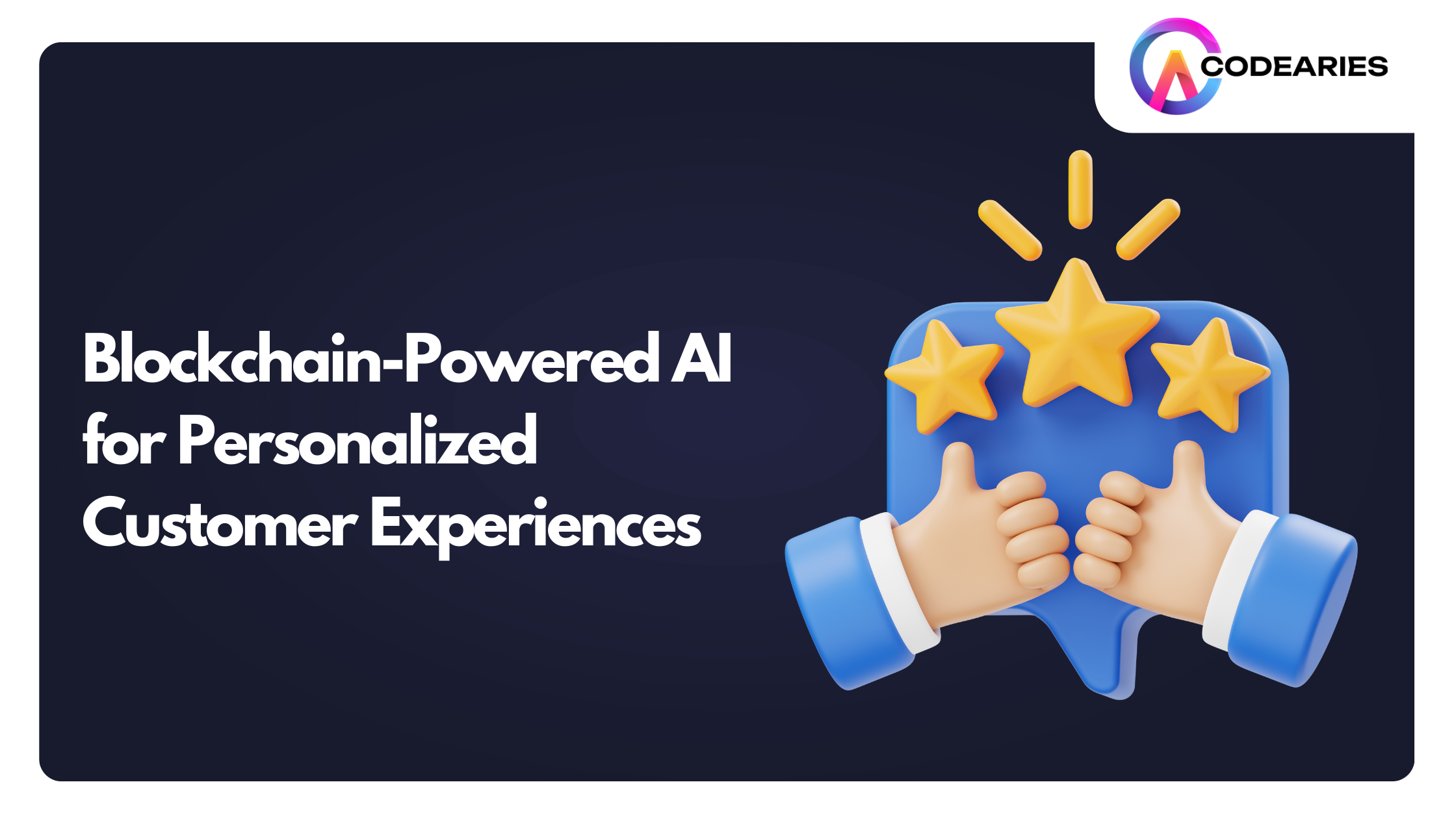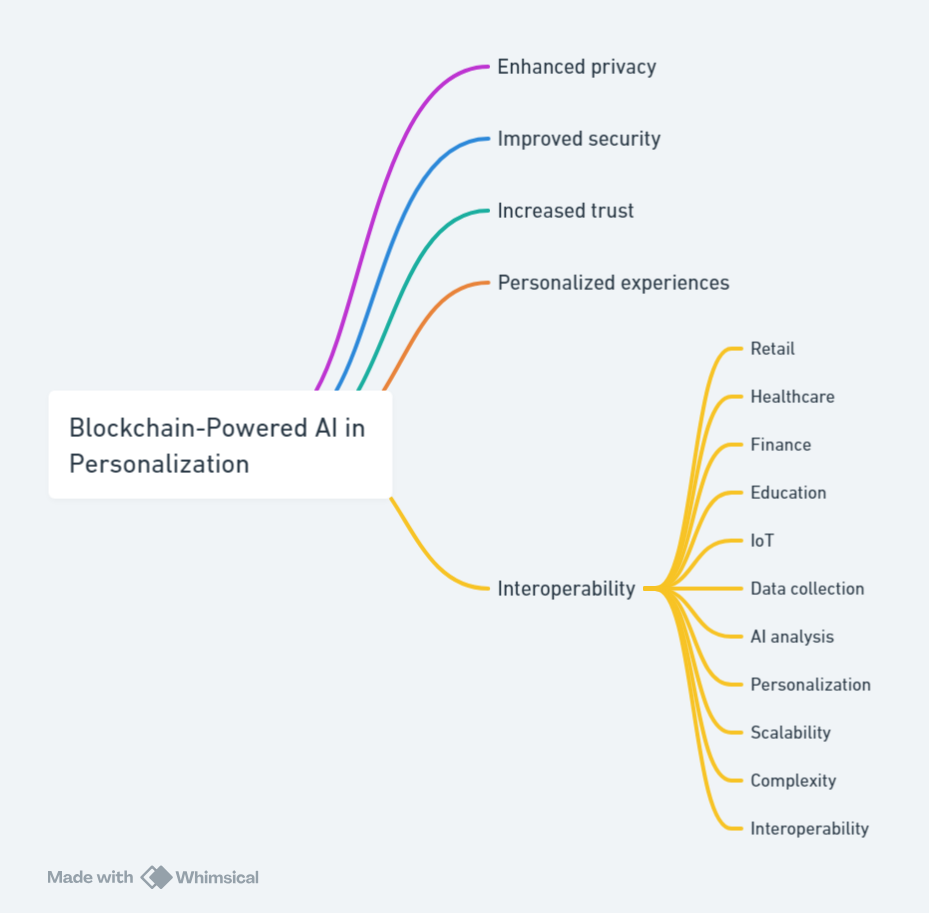
In today’s fast-paced digital landscape, businesses are under pressure to deliver personalized experiences that foster customer loyalty. Artificial Intelligence (AI) has been instrumental in this, enabling companies to offer tailored products and services that align with individual preferences. However, with data privacy concerns on the rise, customers are growing more cautious about how their personal information is used. This is where blockchain-powered AI steps in, combining the strengths of two revolutionary technologies to provide secure, transparent, and deeply personalized customer experiences.
Blockchain-Powered AI: A New Era of Personalization
Both AI and blockchain have already transformed various industries in isolation. AI enables businesses to analyze large datasets, making personalized recommendations that resonate with individual customers. Blockchain, on the other hand, offers a decentralized and immutable way to store information, ensuring data security and transparency. When these technologies are combined, businesses can solve critical challenges in personalization, such as data privacy, scalability, and customer trust. Blockchain-powered AI allows companies to securely store and analyze customer data to create hyper-personalized interactions. Blockchain’s decentralized structure ensures that sensitive information remains private, preventing unauthorized access and fostering trust. This combination empowers businesses to deliver tailored experiences without compromising security.
Blockchain-powered AI allows companies to securely store and analyze customer data to create hyper-personalized interactions. Blockchain’s decentralized structure ensures that sensitive information remains private, preventing unauthorized access and fostering trust. This combination empowers businesses to deliver tailored experiences without compromising security.
The Role of Blockchain in Data Security
Blockchain strengthens AI-driven personalization by addressing vulnerabilities in data security and integrity. Its decentralized ledger ensures that customer data is securely stored, transparent, and tamper-proof. Every transaction is permanently recorded and accessible only with customer consent, allowing individuals to maintain control over their own information.In the context of data privacy regulations like GDPR and CCPA, blockchain offers an essential layer of security. Customers can grant access to their data only when needed, ensuring they maintain full control over how their information is used. Furthermore, blockchain simplifies AI’s data analysis by consolidating verified, trusted data in a single system, enhancing AI’s accuracy and effectiveness.
Ensuring Data Privacy with Blockchain
As businesses become more reliant on data to offer personalized experiences, the need for secure, transparent data handling is critical. Many customers hesitate to share personal information due to fears of misuse or privacy breaches. Blockchain’s decentralized approach ensures that personal data is only accessible on a need-to-know basis, giving customers confidence that their information is handled securely.Because blockchain transactions are immutable, customers can track how their data is being used, building a greater level of trust. Companies that leverage blockchain-powered AI can not only provide enhanced personalization but also assure customers that their privacy is being prioritized.
How AI Enhances Personalization
AI is the driving force behind personalized customer experiences, from curated product recommendations to customized marketing messages. By analyzing vast amounts of customer data, AI can predict behaviors, preferences, and needs, enabling businesses to engage with customers on a deeper level. Whether it’s personalizing a shopping experience or crafting individualized email campaigns, AI helps companies make customers feel understood and valued.Yet, without a secure system to manage this sensitive data, privacy risks loom large. This is where blockchain’s robust data protection capabilities come into play.
Smart Contracts: Automating Personalized Experiences
One of blockchain’s most innovative features is smart contracts—self-executing contracts with terms written directly into code. These can be used to automate personalized offers, rewards, or discounts based on customer behavior. For example, when a customer reaches a certain spending threshold, a smart contract could trigger a personalized discount, creating a seamless interaction without manual intervention.Smart contracts also enable customers to set conditions for how their data is shared, ensuring that privacy preferences are respected before any data exchange occurs. This fosters a collaborative, trust-driven relationship between businesses and their customers.
Use Cases of Blockchain-Powered AI in Retail
The combination of blockchain and AI is driving innovation in retail, enhancing personalization and efficiency. Here are key use cases:
Tailored Product Recommendations: Blockchain securely stores customer data, while AI analyzes it to deliver personalized product suggestions, ensuring privacy.
Transparent Supply Chain: Blockchain tracks product origins, while AI assesses data to ensure ethical sourcing and authenticity.
Counterfeit Prevention: Blockchain guarantees product authenticity, while AI verifies it in real-time to combat counterfeits.
Blockchain-Backed Loyalty Programs: It secures loyalty points, while AI tailors personalized offers based on customer behavior.
Smart Contracts for Transactions: Smart contracts streamline payments and ensure transparent transactions.
Enhanced Customer Experience: Blockchain reduces transaction friction, while AI personalizes customer interactions for a better experience.
Blockchain and AI in Healthcare Personalization
Blockchain and AI are transforming personalized healthcare with innovative solutions that improve security, efficiency, and patient care. Key use cases include:
Personalized Treatment Plans: Blockchain ensures patient data privacy, while AI analyzes this data to offer tailored treatment recommendations.
Drug Safety: Blockchain tracks drug authenticity, while AI identifies counterfeit medications, ensuring patient safety.
Electronic Health Records (EHRs): Blockchain enables seamless access to accurate patient records across healthcare providers.
Clinical Trials: Blockchain secures patient consent and trial data, preventing tampering and ensuring transparency.
Secure Transactions: Blockchain guarantees fraud-free payments, while smart contracts automate processes to improve efficiency.
Personalized Telehealth: Blockchain secures patient data for remote monitoring, while AI enhances virtual consultations for tailored care.
Real-World Examples of Blockchain-Powered AI Personalization
Several companies are already combining blockchain and AI to deliver personalized experiences across different industries:
1. Personalized Retail:
- Meta: The parent company of Facebook is exploring decentralized identifiers (DIDs) using blockchain to protect user privacy while delivering tailored ads.
- Amazon: Amazon leverages AI to analyze customer data on the blockchain, offering personalized product recommendations and deals.
2. Healthcare Personalization:
- Medibloc: This healthcare platform uses blockchain to securely store patient data and AI to provide personalized treatment suggestions.
- IBM: IBM’s blockchain and AI platform enables secure sharing of patient data, helping deliver more personalized healthcare solutions.
3. Personalized Finance:
- Ripple: Ripple utilizes blockchain to facilitate faster cross-border payments, personalized to individual customer needs.
- IBM: IBM combines AI and blockchain to offer personalized financial services, such as investment advice and loan assessments.
4. Personalized Education:
- EduChain: This platform uses blockchain for secure student records and AI for personalized learning experiences.
- MIT: MIT is exploring the use of blockchain and AI to craft individualized learning paths for students.
5. Personalized IoT:
- Hive: Hive leverages blockchain and AI to offer tailored IoT services, such as home automation and energy management.
- Samsung: Samsung uses these technologies to create IoT devices that learn user preferences, delivering personalized experiences.
These examples highlight how blockchain and AI are being used to deliver secure, personalized solutions across industries. As technology advances, these integrations are likely to expand even further.
The Future of Blockchain and AI in Personalization
The combination of blockchain and AI is set to revolutionize personalization across industries. Here’s a brief look at future trends:
- Hyper-Personalized Experiences: AI will use real-time data from blockchain to provide tailored recommendations and predict customer behavior.
- Enhanced Privacy: Blockchain will enable decentralized identities, giving users control over their data, while AI ensures secure data sharing.
- Ethical AI: Blockchain will help govern AI systems transparently, reducing bias and ensuring ethical personalization.
- IoT Integration: Personalized IoT devices and AI-powered smart cities will use blockchain-secured data for customized services.
- New Business Models: Individuals can monetize their personal data, and blockchain will create personalized marketplaces.
- Regulatory Frameworks: Global standards and updated privacy laws will guide the ethical use of blockchain and AI in personalization.
This fusion promises secure, tailored experiences while ensuring privacy and ethics.
Conclusion
The convergence of blockchain and AI is reshaping how businesses approach personalization, offering a secure, transparent, and scalable framework for delivering tailored customer experiences. By combining blockchain’s data privacy and integrity with AI’s ability to understand and predict customer needs, companies can provide hyper-personalized interactions that build lasting trust and loyalty.As these technologies continue to evolve, blockchain-powered AI will play a pivotal role in transforming personalization across industries, driving more secure, efficient, and impactful customer experiences.
FAQs
1. How is Netflix using AI to enhance customer experience?
Netflix uses AI to provide personalized recommendations by analyzing user data like viewing history and preferences. AI also adjusts streaming quality based on internet speed, ensuring a smooth experience. Additionally, Netflix utilizes AI for content creation, such as generating personalized thumbnails, boosting user engagement and satisfaction.
2. How do AI chatbots improve customer experience?
AI chatbots offer instant, 24/7 support, handling repetitive tasks like answering FAQs and troubleshooting. They use Natural Language Processing (NLP) to understand queries, reducing response times. AI chatbots also gather insights to help businesses improve service and increase customer satisfaction.
3. How can AI increase customer engagement?
AI boosts engagement by analyzing customer behavior to deliver personalized interactions, such as targeted product recommendations and tailored marketing. It also helps brands improve their strategy by analyzing customer sentiment and providing relevant, timely content.
4. What are the benefits of AI in customer service?
AI improves customer service by:
- Increasing efficiency with instant responses to queries,
- Providing 24/7 availability,
- Reducing costs by automating tasks,
- Enhancing personalization through data analysis, and
- Scaling operations to handle growing customer demand.
This leads to faster, more personalized customer support.


